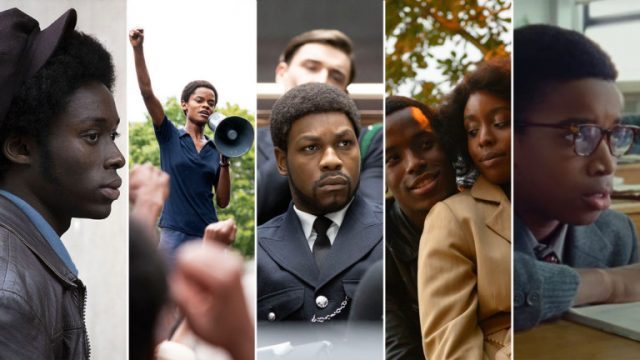
Steve McQueen’s Small Axe consists of five powerful stories of racism and harassment of West Indian immigrants in London from the 1960s to the 1980s (photo courtesy BBC One)
BIG SCREEN SUMMER NYFF58 REDUX
Elinor Bunin Munroe Film Center / Walter Reade Theater
144 / 165 West 65th St. between Broadway & Amsterdam Aves.
June 11 – August 26, $10-$15
www.filmlinc.org
One of the joys of fall, and the signal that the summer blockbuster movie blitz is over, is the New York Film Festival. Since 1963, the NYFF has been presenting a wide range of works from around the world, often with postscreening discussions with members of the cast and crew. The 2020 edition was completely virtual because of the pandemic lockdown, so Film at Lincoln Center (FLSC) is bringing much of the festival back with “Big Screen Summer: NYFF58 Redux,” featuring nearly three dozen films now being shown the way they’re supposed to be seen, on large screens at the Elinor Bunin Munroe Film Center and the Walter Reade Theater. Running June 11 to August 26, “NYFF58 Redux” gets under way with two weeks of Steve McQueen’s mammoth five-part epic about West Indian immigrants in London from the 1960s through the 1980s, Small Axe, which was actually made for television; it screens with a newly recorded interview with McQueen, who started as an experimental filmmaker and has made such previous films as Hunger, Twelve Years a Slave, and Shame, and FLSC director of programming Denis Lim.
The multi-award-winning anthology, which premiered on BBC One in the UK and Amazon in the US, begins with Mangrove (June 11-17), the true story of Frank Crichlow (Shaun Parkes) and the Mangrove Nine, Trinidadian immigrants who were harassed mercilessly by Notting Hill police for establishing a peaceful community at Crichlow’s Mangrove café. The second film, one of the best of 2020, is the exhilarating Lovers Rock (June 11-24), a seventy-minute reggae house party in London in 1980, where a group of men and women dance, sing, and fall in love in a cramped space to such songs as Dennis Bovell’s “Silly Games.” (If you’re wondering who the lone old man is, it’s Bovell himself, making a cameo.) But even as Martha (Amarah-Jae St. Aubyn) and Franklyn (Micheal Ward) hit if off, the spectre of racism is not far away. Intimately photographed by Shabier Kirchner, Lovers Rock is an unforgettable experience.
In Red, White and Blue (June 11-17), John Boyega stars as the real-life Leroy Logan, a frustrated West Indian man who joins the London Metropolitan Police department, hoping to change its fundamental racism from the inside, much to the chagrin of his father (Steve Toussaint). Boyega is riveting as Logan discovers that achieving his goal is going to be a lot harder than he ever imagined. Sheyi Cole makes his film debut in the true story Alex Wheatle (June 12-16) as the title character, a teenager caught in England’s discriminatory social services structure and then arrested for participating in the 1981 Brixton uprising, a protest against poor socioeconomic conditions for the African-Caribbean community that included “Bloody Saturday.” The remarkable anthology concludes with Education (June 11-17), an hourlong exploration of institutionalized segregation in the British school system through the eyes of Kingsley (Kenyah Sandy), who is sent to a “special” school where West Indians are purposely kept undereducated, their potentials squashed early in life. A grand achievement by a master filmmaker, Small Axe is no mere historical document of what happened in London decades ago; it is a powerful examination of systemic racism and anti-immigrant biases that is still alive and well in the twenty-first century, especially here in America.
“Big Screen Summer: NYFF58 Redux” continues through August with such other 2020 film festival favorites as Hou Hsiao-hsien’s Flowers of Shanghai, Joyce Chopra’s Smooth Talk, C. W. Winter’s The Works and Days (of Tayoko Shiojiri in the Shiotani Basin), Eugène Green’s Atarrabi and Mikelats, Cristi Puiu’s Malmkrog, William Klein’s Muhammad Ali, the Greatest, Raúl Ruiz and Valeria Sarmiento’s The Tango of the Widower and Its Distorting Mirror, Jia Zhangke’s Xiao Wu, and Orson Welles’s Hopper/Welles, an epic conversation between Welles and Dennis Hopper.